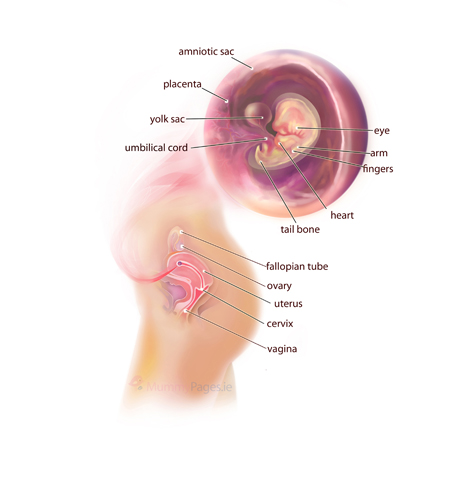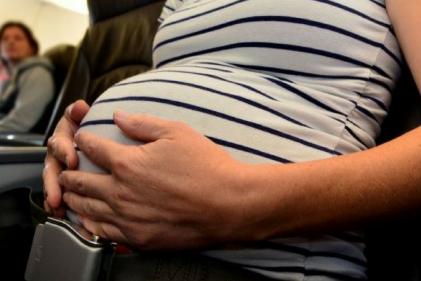Week 7 brings some fascinating changes for your little baby. Facial features are becoming more defined, little finger buds are forming, and your baby is starting to move and explore his or her temporary home. You may notice some minor changes in yourself this week, but overall, your symptoms will mimic last week’s.
Your Baby This Week
Week 7 and your baby is now the size of a blueberry, which measures about 1.3 cm (1/2 inch). When your baby was first conceived, it took several days for the cells to begin dividing and multiplying and when they started, they were only multiplying very slowly. Now, in your 7th week of pregnancy, your baby's cells are multiplying at a rate that creates about 6,000 per hour! It’s no wonder that your baby has doubled in size since last week.
At 7 weeks, the sex of your baby is still undetermined. Although the tissue that forms the genitals (the genital tubercle) is present now, it does not become recognisable until around week nine. Arms and legs that just last week were little buds, now have what looks to be the start of hands and feet! The same hands and feet you will soon be tickling and kissing! The eyes now have eyelids that are still forming, but visible. Small blood veins can now be seen through the skin, which is almost translucent at this point. The umbilical cord now has its own structure of blood vessels that deliver oxygen and nutrients from you to your baby. Red blood cells are being produced by the liver for now (this will stop once your baby has bone marrow which will then take over making red blood cells). The pancreas and intestines are also quickly developing. Even elbow joints are forming at this early stage in your pregnancy.
Even though your baby is only the size of a blueberry, he or she is very active now swimming around in the amniotic fluid and even kicking the little leg buds. You won’t feel any movement yet, but you soon will!
Your Body This Week
At seven weeks into your pregnancy, your uterus is now twice as large as it was pre-pregnancy and your body now carries around 10 percent more blood than it did prior to becoming pregnant. This is just the beginning though. By the time you are ready to deliver, your uterus will be the size of a watermelon and your body will have about 45 percent more blood. The addition of blood flow and your growing uterus will both cause you to urinate more frequently now. In fact, as your pregnancy progresses, your need to urinate more often and the volume of urine you produce will increase.
If you are experiencing morning sickness, it will probably be sticking around for a while longer. Most women who have morning sickness find that once the first trimester is over, it goes away. So hang in there!
Prenatal care is vital to ensuring a healthy start for your baby and a healthy pregnancy for you. So, now is the time to make an appointment for your first prenatal visit, if you have not already done so. Your first prenatal visit is normally carried out by your obstetrician or hospital antenatal clinic around the 12th to 14thweek of pregnancy, but this can vary greatly depending on your chosen hospital or clinic. If you have not been through this before, you’re probably wondering what will happen at the first appointment.
The overall goal is to chart the progress of your pregnancy and give you information that will help you make good decisions throughout the pregnancy. The doctor or midwife will ask you some questions about your medical history and your lifestyle. Your height and weight will be recorded, as well as your blood pressure. The doctor will test your urine for protein levels (presence of protein in the urine could indicate the condition pre-eclampsia) and you will also be asked to have a blood test. Your doctor or midwife may feel your tummy – this is done throughout pregnancy to check the baby is growing properly and as you get nearer your due date, to see what position your baby is in. If you are far enough along, your doctor or midwife may listen to the baby’s heartbeat and take measurements of your uterus and baby.
The doctor will also answer any questions you have, so it’s a good idea to jot them down when you think of them and take the list to each appointment.
Pregnancy Tip
If you have a cat, like to garden, or enjoy rare meat, take heed. A parasitic infection called Toxoplasmosis can be contracted from cat faeces and undercooked meat. Toxoplasmosis causes flu-like symptoms and for most is very minor. However, if contracted during pregnancy, the infection can be passed to your baby and can lead to extremely serious illnesses. It’s recommended to not come in contact with litter boxes, to wear gloves if you are gardening and to only eat meats that are cooked right through.








